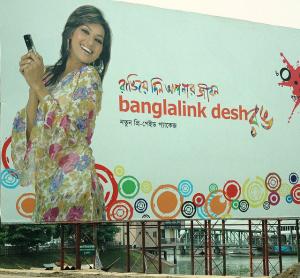 Bangladesh is the eighth most populous country in the world. Every month, it imports 1.3 mobile phone handsets and in recent years computer sales have sky rocketed. That means that each person has at least one hand set (most are not registered so official numbers do not reflect this). While some people are buying new computers and phones for the first time, many are replacing older, outdated technology.
Bangladesh is the eighth most populous country in the world. Every month, it imports 1.3 mobile phone handsets and in recent years computer sales have sky rocketed. That means that each person has at least one hand set (most are not registered so official numbers do not reflect this). While some people are buying new computers and phones for the first time, many are replacing older, outdated technology.
But the problem is, in Bangladesh, there is nowhere to actually get rid of old tech items – except in the dumpster.
“Currently, there is no comprehensive e-waste policy in the country. The national ICT policy established in 2009 briefly mentions e-waste, but because it falls under no particular government sector, no one is actually required to comply to any measures,” explain Sarker and Hasan in a conversation with APCNews.
The confusion lies around who is responsible – the Ministry of Environment or the ICT ministry- say the authors.
This is then compounded by the fact that Bangladesh’s environment policy spans fifteen different sectors, all with their own ministries and policies.
“And the ICT Ministry doesn’t have the authority to work with the bigger Ministries. As a result, is the issue of e-waste is simply not addressed,” say Sarker and Hasan.
When e-waste is addressed, it is on an ad hoc basis with no serious research or data to back anything up.
“This is especially true where policy is concerned, because neither Ministry has a policy wing or people with the capacity to perform specific research. This is where civil society and media have a large role to play in building awareness – because policy formulation is typically prompted by pressure from these actors,” they continue. The corporate sector also has a vested interest in keeping environmental issues on the down-low, as it feels that businesses will lose their competitive edge if environmental concerns (seen as a charitable concern) are integrated into everyday practices.Its capital interests remain the highest prioirty.
People don’t see the negative side of ICTs
The authors say that ICTs have been presented by government and the media as a panacea to Bangladesh’s problems. “ICTs are seen in a positive light. For example, our disaster management system uses technology to help identify potential oncoming disasters and alert authorities before they hit the country,” say the authors.
“It is difficult for people to see that technology without a disposal management poses a serious threat to the environment, people’s health and livelihood and general well-being. No formal sector exists for e-waste management or recycling. People are not making the connection because they only see the usage side of this but not the life after usage, which can pose invisible problems to them. ”
Lots of research on climate change, little on e-waste
But the lack of awareness regarding e-waste say the authors is also due to a lack of environmental awareness in general. Some research has been done in the country on sustainable development issues, but it is only just beginning to take place.
As is one of the most flood-prone countries of the world, it is estimated that 10% of the Bangladesh’s land would be flooded if the sea level were to rise by just one metre. So current research is dominated by climate change.
One of the reasons e-waste and other ICT and environment issues are not addressed is that there just isn’t much data available on the topic or any comprehensive research available as a baseline. The government does look for facts and input from civil society from time to time, especially research-based evidence.
This is where civil society can play a key role, according to Sarker and Hasan. “Most civil society organisations have never been involved with ICTs and so they don’t have the capacity to address the issues. If there are no ICT experts in an organisation, they tend to shy away from ICT-related work. In this sense, our report is a very useful resource as we have compiled all the information about what is being done in the area of ICTs and environment – espeically e-waste.”
According t0 Sarker and Hasan, civil society has a large role to play in conducting research, bringing research-based evidence which then can be used for advocacy andinfluencing policy, Media on the other hand also has a key role to play in building generalawareness on this issue and its possible impacts.
“If one issue is presented to the media and they pick up on it, then everyone tends to jump in and start working on it. E-waste is an area just waiting to explode onto the public’s consciousness” then conclude.
This article was written for APC’s GreeningIT initiative and is based on the report by Bytes For All and the Global Information Society Watch 2010 report for Bangladesh .
Photo by Wonderlane. Used with permission under Creative Commons license 2.0